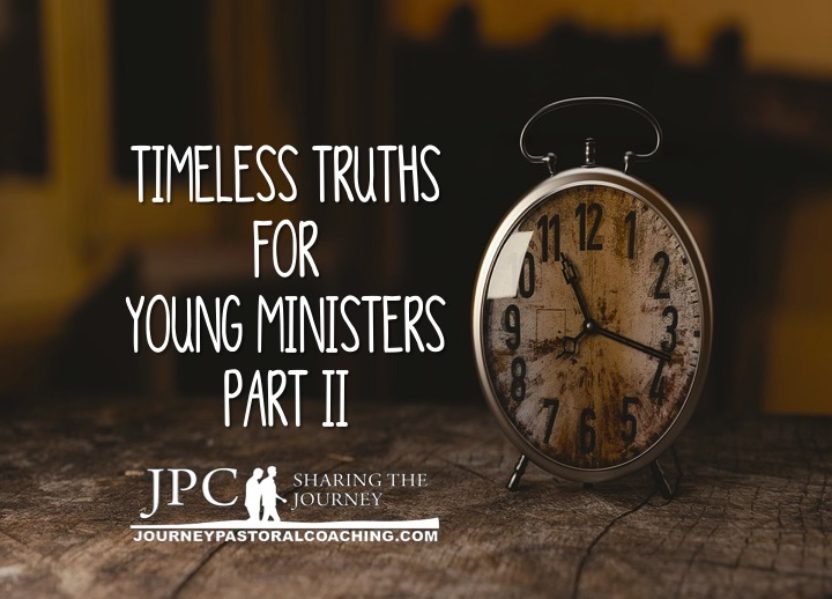Timeless Truths for Ministers Pt II
In this post, we continue with the second in a three-part series on essential truths for the young minister.
These are minister and ministry sustaining lessons I’ve learned over three plus decades. Ignore them at your peril. Act on them and to not only survive, but thrive in ministry.
Be sure to also read Part One of Timeless Truths for Young Ministers. (Click here)
8. Build a small circle of peer-mentors
After Jesus ascended to heaven, the Apostles had only each other. But they had each other. Even though he was the leader of the pack, the Apostle Peter was still a member of that very small circle of peer-mentors we know as The Twelve: each one bound to the others in shared mentorship.
Thirty-five years into pastoring young pastors, I am convinced that peer-mentorship is one of the Big Three Keys to surviving and thriving in ministry, the other two being a disciplined and vibrant spiritual life, and walking with a pastoral coach.
I am equally convinced that the absence of peer-mentors is one of the greatest causes of young ministers leaving the ministry completely or remaining in ministry but shutting down, shifting into cruise and simply going through the motions.
Jesus paired his disciples in teams of two when he sent them out in ministry. The reasons are obvious:
First, encouragement. Contrary to the greatly romanticized view from the outside, ministry can be a very lonely life. When Jesus sent his disciples out two-by-two, He knew that mutual encouragement would break the chains of loneliness and doubt, discouragement and surrender. Two really are better than one (Ecclesiastes 4.8-9).
Second, accountability. How many times have we cringed at the words or actions of Christian leaders, words and actions disconnected from Christ and His Word? Such instances are sure signs of a leader living without accountability, someone to say, “Stop, this is not what Jesus taught us to say and do.”
James Emery White, in his book, Serious Times, writes that “One of the more unsettling revelations to most Christ followers, particularly in light of our fierce individualism, is how many of the marks of a Christian involve other people . . . Following Him is tied to the “one anothers.”
God did not build you to walk alone. He built you to walk in strength with a small circle of peer-mentors.
9. Listen to your mate in ministry matters
This is not to say that you should turn your ministry over to your mate. Not at all.
But your mate is daily picking up signals, nuances and reads – heavenly and earthly – that you are missing. Their “sixth sense” may just be the wisdom of the Lord to you in the situation you are facing, providing insight and protecting you from those “I wish I’d thought of that “ moments.
Throughout our life in ministry together – and that really is the key, “together” – from time to time, my wife has shared ideas or concerns about individuals, relationships or other ministry matters. When she does, I open my ears, my mind and my heart to this first of my first line counselors. Time and time again, her wisdom has been to me what the Bible calls, “fine gold.”
I am so convinced of the wisdom of involving your mate in your ministry, I will make a confession: I have always asked my wife to bless my preaching ministry (long and short term planning, preparation and delivery) with her insights, counsel and reviews. Her help has been invaluable to me. I am a much better preacher of God’s Word because of my wife’s invisible help.
Listen to your mate in ministry matters.
10. Above all else, first remain a child of God.
Over more than three decades of ministry I have known many ministers of the Gospel. While they are all heading for heaven, not all of them have remained children of God.
How do I know? Because there have been times when I wasn’t one either.
Oh, I was a believer, a Christian, and a follower of Christ, but my heart was not that of a child.
I had . . . arrived.
As a pastor, I was a professional Christian, the one to not only lead others in following Christ but to point to my own example as a follower of Christ.
My heart was not that of a child. I had “grown up.”
What I had really done was “grow out” of a childlike heart.
Jesus said that we must be as little children in coming to Him. Children in heart. Children in need of Him. Children dependent on Him and desiring Him. A child.
Yes, the Scriptures teach us to be mature in understanding and to put away childish things, but they also admonish us: I have calmed and quieted my soul. Like a weaned child with his mother. Like a weaned child is my soul within me (Psalm 131.2).
As you lead others and see to the many responsibilities of your life and ministry, this do first and last and always: above all things and in all things, remain a child of God in your heart.
11. Don’t sell yourself
At some point in ministry, someone is going to offer you a ring to rule all other rings. A ring of power.
The price tag on the ring will say something like, “Play politics,” “Close your eyes to what is happening,” “Don’t object,” or “Take the money and give them what they want.”
That’s what the price tag will say.
But the cost will be you: Your integrity; Your ministry; Your personhood; Your call; Your service to God.
Define early and well the borders of your life: where you can go and where you cannot go. And then, with bulldog tenacity, lock in and lock down those borders. Don’t go beyond them.
Don’t take the ring.
The temptation will be to take the ring “just this once,” just in this most unique of situations.
The temptation will be to break your rule and cross the line just in this case.
But you must not take the ring. You must not even touch the ring. You must not cross the line.
Or one day, ring of power firmly in hand, you will look back across the valley of decision and see yourself, the man or woman you used to be. And you will see yourself, your ring of power firmly in hand – and in a heart that has been bought and paid for by another Master. Sold.
You have been bought with a price, the precious blood of Jesus Christ. You are owned by Him.
Don’t sell yourself. At any price.
12. Understand that your ministry is not what you do for God
(It’s who you are in God.)
God’s first work in and through you is to make you a disciple of Jesus. Out of all the things He could have created you for and called you to, He created and called you first to Himself.
And that means that He created and called you to ministry, first and foremost, as the place where He wants to disciple you.
Don’t read that last sentence too quickly; pause and seriously consider what it means to you today and to what you do for God today. Yes, ministry is where you do for God, but first, and of equal importance, it is where God does in you, it is the place where God has chosen to disciple you.
My wife, two daughters and I were privileged to serve as missionaries to Europe for twenty years. I remember traveling the US from church to church raising the monthly support needed to go to Europe for our first term. It was a wonderful time of anticipation and preparation. In prayer I told God of all the great things I wanted to do for Him in Europe. God spoke gently to me, “You’ve missed the point. Yes, I’m sending you to Europe to preach the Gospel and to make disciples, and that you will do, but that’s not the point. I am sending you there because Europe needs the Gospel and because sending you to Europe is what it will take for me to do in your life what needs to be done in your life.” Punch to the stomach: God was not sending me to Europe because Europe needed me, but because I needed Europe; God had to send me to a completely different continent to make me who He wanted me to be.
Thank God that He did. I wouldn’t have missed it for anything: the people, the ministry, the miracles.
But most of all, for what God did in me, reminding me that my identity defines what I do, but what I do does not define my identity. My identity is who I am in Christ, my Creator and Redeemer.
13. Being and doing. Learn the diversity. Live the unity.
When I begin walking with a young minister, one of the first questions I ask is, “what does God do? After some silence, the minister usually begins to recite a list of divine actions described in Scripture: God loves, God seeks sinners, God saves. etc. I ask again, “Yes, but why does He do these things; why does God love, seek, save, etc.?” The answer is clear: “Because that is who God IS.”
What does God do? God does who He is and who He is, is what He does: God’s actions are the pure expression and demonstration of His essence. In His perfection, He is, and from His being, He simply does. God’s being and God’s doing are one. Divine integrity. Wholeness. There is no shadow of turning in Him. Thank God!
If only ministers could be like the God of whom we speak, if only our doing came from our being and if only from our being, we would do.
And yet, the ministry is filled with well-intentioned individuals who live outside of themselves, taking on roles and ministries for which God never created them and to which God never called them: what they do is foreign to their being.
But what if, like God, each of us would be the Jeremiah 1.5 creation of God lived out in the Mark 3.13-14 call of God, doing what comes naturally to us because it is who God made us to be.
Not that we don’t need to grow and not that a lot of developing won’t take place as we live out our creation and fulfill God’s call. An acoustic guitar will always be an acoustic guitar. But time in the hands of a master will mature the materials and craftsmanship of the guitar, developing the colors of its tone. In the hands of the master, each individual instrument is fully developed and utilized according to its own unique nature.
Be who God made you to be. And from your being, do as you remain in the hands of the Master.
Being and doing. Learn the diversity. Live the unity.
14. Pastor like Jesus pastored: according to the numbers.
In understanding the pastoral ministry of Jesus, it is important to study it in its chronology.
Early in His ministry, Jesus focused his time and attention on crowds. But as time moved toward the climax of the Cross, Jesus personally focused less and less on crowds while focusing more and more on the Twelve, and even more on the inner circle of the Three.
Why did Jesus do this?
Jesus answers this question several times in the Gospels: He devoted his time and energy to a small circle of disciples so that He might multiply His ministry of salvation to as many people as possible.
To be most effective in His mission, Jesus devotes the best of His time, attention, energy, discipleship, friendship first to the Three, then the Twelve, the 70, and finally, the 5000 (ie, the crowds).
With intent, Jesus focused his ministry not on the crowds, but on the few.
But even as he focused on the few, he never walked past the one. The individual in need. In all of this, even with the Cross in sight and the weight of the world on His shoulders, Jesus made time for the one who truly needed Him.
Why?
Because Jesus was not focused at all on numbers. And He was not only focused on the one. He was focused on the everyone: go, make disciples of all nations, beginning right here where you are . . .
————————
NOTE: Journey Pastoral Coaching exists to provide pastoral coaching to Millennial ministers.
Saddled with large student debt, just beginning to set up homes and start families, and serving in low paying first and second positions, Millennials are those who most desire but can least afford to pay for pastoral coaching.
So we offer it to them at NO COST: Our members do not PAY for coaching; they EARN it.
We are able to do so thanks to the faithful and generous support of individuals and churches like yours who want to see young leaders not only enter the ministry, but remain in the ministry. If you or your church would like to help Millennial ministers in 20 US states and 5 nations build strong for a lifetime in ministry, please click here to contact us by email or to support Journey monthly or with your one-time gift. Thank you.
We also invite you to click and subscribe to our twice-monthly blogs at journeypastoralcoaching.com
“In the early years when I was becoming a pastor, I needed a pastor.”
Eugene H. Peterson, The Pastor: A Memoir






